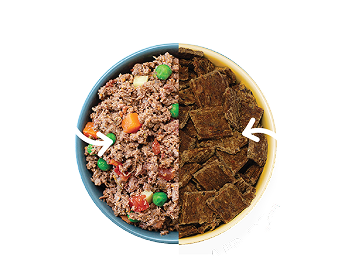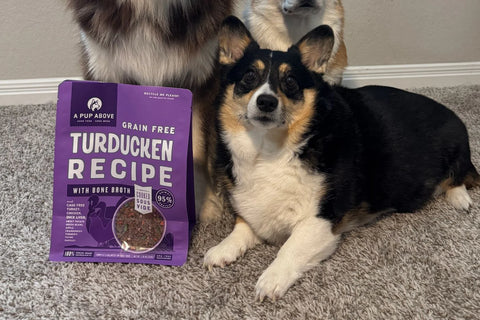
What's the Best Protein for Dogs?
Key Takeaways:
- A high-quality protein source supports tons of bodily functions, including the production of enzymes and hormones that regulate metabolism and digestion. Dogs who get enough protein in their diet often have more energy, healthier muscles, and stronger immunity.
-
The most popular proteins for dogs include chicken, beef, and fish. For dogs with allergies or sensitivities, novel protein sources can include venison, rabbit, kangaroo, bison, and more. If your pup can’t eat any animal protein, you can feed lentils, quinoa, and peas — but it’s important to know that dogs often thrive with at least some animal protein in their diet.
- Different breeds have different protein requirements. It’s important to learn more about your dog’s needs based on their size, breed, age, and more.
When it comes to your dog’s diet, protein is one of the most essential nutrients they need to thrive. Like humans, dogs require protein to maintain muscle mass, build strong tissues, and support various bodily functions.
However, not all proteins are created equal. At A Pup Above, we know that choosing the right protein for your dog plays a pivotal role in ensuring they live a long, healthy life.
In this article, we’ll take a close look at the best sources of protein for dogs, breaking down the benefits of each type and helping you make an informed decision when it comes to feeding your pup.
Why Is Protein Essential for Dogs?
Protein is a fundamental nutrient in any dog’s diet. It’s made up of amino acids, which are the building blocks for cells, muscles, tissues, and organs.
Without an adequate amount of protein, dogs may experience muscle loss, weakened immune systems, and poor skin or coat condition. For growing puppies, active adult dogs, and senior pups alike, protein provides the fuel for healthy growth, energy, and vitality.
A high-quality protein source supports tons of bodily functions, including the production of enzymes and hormones that regulate metabolism and digestion. Dogs who get enough protein in their diet often have more energy, healthier muscles, and stronger immunity.
While protein from animals is considered more complete, plant-based proteins can also be good options (if they are balanced with other proteins). The right balance of protein can also help support weight management and aid in digestion, helping your dog maintain a healthy body condition and overall well-being.
Why Are Animal-Based Proteins the Gold Standard for Dogs?
Animal-based proteins are seen as the gold standard when it comes to feeding your pups. These proteins are complete, which basically means that they contain all the essential amino acids your dog needs.
Chicken
Chicken is one of the most popular and digestible animal proteins for dogs. It’s lean, low in fat, and high in amino acids, making it a great choice for maintaining muscle mass and overall health. Chicken also provides important vitamins and minerals like niacin and vitamin B6.
Beef
Beef is another excellent protein source, especially because it offers a rich flavor that many dogs love. While it’s slightly higher in fat than chicken, lean cuts of beef are packed with protein and nutrients that help your dog’s energy levels and immune system.
Fish
Fish such as salmon and sardines offer omega-3 fatty acids, which are great for supporting joint health and promoting a shiny coat. Fish proteins are also known for being gentle on dogs with sensitive stomachs.
Choosing high-quality animal-based proteins ensures that your dog receives the full spectrum of nutrients they need to thrive. A good rule of thumb to keep in mind when looking for food options is to check that the protein sources are listed as the first ingredient because that signifies the quality and quantity of protein in the meal.
Can You Give Your Dog Plant-Based Proteins?
While animal-based proteins are the preferred source for dogs, plant-based proteins can also play a role in a well-balanced diet. These protein sources, such as peas, lentils, chickpeas, and quinoa, provide a different set of nutrients that can support your dog’s health when combined with animal proteins.
Peas
Peas are commonly used in dog food because they’re rich in protein, fiber, and essential amino acids. They are especially good for dogs who may need a bit of extra fiber to support digestion. Peas also provide vitamins A and K, and their antioxidant properties support overall health.
Lentils
Lentils are another plant-based protein with a high fiber content, which helps regulate your dog’s digestive system. Packed with protein and minerals like iron and potassium, lentils also promote strong muscles and healthy energy levels.
Quinoa
Quinoa, a pseudo-grain, is a high-protein seed that contains all nine essential amino acids, making it a complete protein. It’s a great option for dogs with food sensitivities or allergies to traditional animal-based proteins.
Though plant-based proteins are not as complete as animal-based proteins, they provide a healthy, hypoallergenic alternative for dogs with sensitivities to specific animal proteins. Many dog foods now incorporate a combination of animal and plant-based proteins to offer a diverse nutritional profile.
When Should You Consider Novel Proteins?
For dogs with food allergies or sensitivities, novel proteins may be a perfect solution. Novel proteins refer to less common animal protein sources like venison, kangaroo, or bison. These proteins are often used in limited-ingredient diets designed for dogs with food sensitivities or allergies.
Venison is a lean protein that’s often used in specialized dog food formulas. It’s an excellent choice for dogs who may react poorly to more common meats like chicken or beef. Venison is high in iron and B vitamins, which support muscle function and overall health.
Kangaroo is another unique protein option, prized for its low-fat content and high levels of zinc, iron, and omega-3 fatty acids. This makes it an ideal choice for dogs needing a lean, easily digestible protein.
Bison is also a great option for dogs with food sensitivities. Rich in protein and low in fat, bison provides essential vitamins and minerals, like selenium and vitamin B12, to promote a strong immune system.
Are There Specific Protein Requirements for Different Dogs?
Different dog breeds and life stages may require different protein levels, and some breeds may benefit more from specific protein sources. This section will dive into some specific protein requirements for different breeds and dogs at different stages of life.
Small Breeds
Small pups tend to have faster metabolisms and higher energy needs. They typically benefit from protein-rich diets that help maintain lean muscle mass. Animal-based proteins like chicken, turkey, and fish are great options because they provide digestible and high-quality protein for energy.
Large Breeds
Larger dogs often need a higher protein content to support their muscle structure and maintain joint health. However, it’s important to balance this with the correct fat-to-protein ratio, given that too much protein can stress their kidneys over time. Lean proteins like beef and bison are often recommended for large breeds to make sure they receive adequate protein without excessive fat.
Active or Working Dogs
Dogs that are highly active or work, such as herding or hunting dogs, require more protein to fuel their physical exertion. They often thrive on animal proteins, particularly those from fish, beef (which makes our Texas Beef Stew a great option for especially active pups!), or even lamb. These proteins provide the essential amino acids to support muscle recovery and stamina.
Senior Dogs
As dogs age, their protein needs shift. Older dogs benefit from high-quality, digestible proteins like chicken or turkey, which help preserve muscle mass and support healthy weight maintenance without putting extra stress on their organs.
FAQs
What meats should dogs avoid?
Chicken and turkey skin, ham, and other fatty cuts of meat are not great for dogs because they have a high fat content, which can cause acute pancreatitis, a life-threatening illness with severe complications. It’s important to avoid turkey and chicken bones, too.
Is 30% protein too high in dog food?
AAFCO recommends that the daily requirements for dog diets should contain at least 22% DM for growth and 18% DM for maintenance. Current research states that there is no added benefit to excess protein in the diet. The maximum amount for any life stage should not exceed 30% DM.
How often should a dog be fed?
Dogs have a simple stomach anatomy, just like humans. After eight to 10 hours, an empty stomach begins to send signals to the brain that stimulate a hunger response. For this reason, at least two meals per day are best for your dog.
Wrapping Up
Picking the right protein for your dog? A few things to keep in mind: their age, breed, energy level, and any sensitivities. Most dogs do best with high-quality, animal-based proteins like chicken, beef, or fish. They’re easy to digest and packed with the amino acids your pup needs.
If your dog has allergies, you might want to try something different, like venison or kangaroo. And, of course, your vet can help guide you based on your dog’s unique needs. Quick tip: always check the label — protein should be the first ingredient. That’s how you know you’re giving your dog the good stuff.
Sources:
Pet food safety: dietary protein | NIH
Can Dogs Eat Peas? What to Know About this Ingredient | American Kennel Club
Using B12 Supplementation to Improve Quality of Life in Dogs | ASPCApro
Nutrition for aging cats and dogs and the importance of body condition | NIH
Top Stories

Why Do Dogs Lick Their Paws?

Why Do Dogs Whimper & Make Noises in Their Sleep?

Healthy Vet-Approved Homemade Dog Food Recipes

How To Cook Sweet Potatoes for Dogs






















